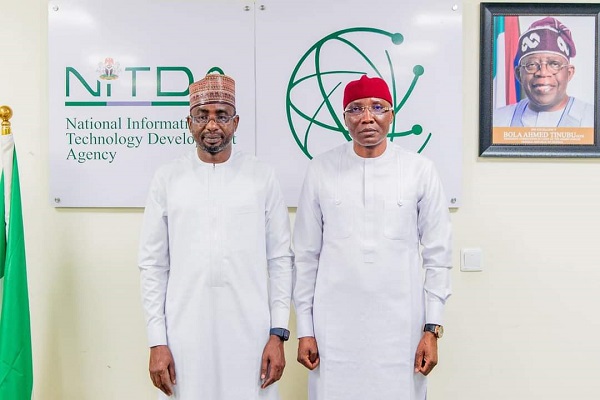
The director-general of the National Information Technology Development Agency (NITDA), Mallam Kashifu Abdullahi, has assured the president of the Chartered Institute of Forensic and Certified Fraud Investigator of Nigeria (CIFCFIN) of NITDA’s readiness to collaborate with the institute on digital forensics.
The aim is to strengthen the tech ecosystem and combat cybercrimes in the digital space.
During a meeting at NITDA’s corporate headquarters in Abuja, Abdullahi expressed concern about the damaging impact of cybercrimes on the economy, organisations, and individuals. He emphasised the need to build capacity to protect against unscrupulous elements and highlighted the importance of incorporating security into the design of digital services from the outset.
NITDA has been proactive in safeguarding cyberspace through awareness campaigns, capacity building, and infrastructure development. However, Abdullahi acknowledged that collaboration with key stakeholders, including individuals, organisations and other sovereign nations, is vital to achieving the best results in combating cyber threats.
Perpetrators of cybercrimes invest significant resources in research and utilize powerful tools to launch attacks. Abdullahi stressed the importance of an organised defence to counter such attacks effectively. To further enhance cybersecurity efforts, NITDA is planning to establish a cybersecurity laboratory in collaboration with CIFCFIN.
While discussing specific areas of collaboration, the president of CIFCFIN, Dr. Iliyasu Gashinbak highlighted the Institute’s desire to partner with NITDA on digital forensics and cybersecurity. The requests included training and certification programmes, research and development, information sharing and collaboration platforms, policy development and advocacy, joint workshops and conferences, standardisation and accreditation.
In response, Abdullahi affirmed NITDA’s commitment to scholarships and certifications in partnership with Coursera. The agency has conducted various cybersecurity training programmes for staff of government ministries, departments and agencies (MDAs), both in hybrid and physical formats.
Abdullahi expressed optimism that the collaboration with CIFCFIN would lead to significant improvements in the cybersecurity architecture of Nigeria’s tech ecosystem. He congratulated the Institute on the successful signing of its Establishment Act into law.
Gashinbak, in turn, assured NITDA of the Institute’s dedication to making the collaboration a success. Along with the previously mentioned requests, he appealed for support in providing computers for the Nigerian College of Forensics and Fraud Investigators (NCFFI), technical assistance for deploying combined e-portal and e-learning platforms and a post-graduate scheme/scholarship.
The collaboration between NITDA and CIFCFIN is expected to bolster efforts in combating cyber threats and securing the digital landscape of Nigeria.


